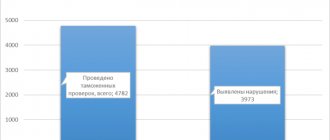According to the customs code, the period for release of goods by the customs authority should be no more than 1 day, in some cases the period is even shorter - 4 hours from the time of registration of the declaration (Article 196 of the Customs Code of the Customs Union).
The customs authority may suspend the release of goods if objects of intellectual property are discovered.
Labor Code of the Customs Union, Article 196. Deadlines for release of goods:
The release of goods must be completed by the customs authority no later than 1 (one) working day following the day of registration of the customs declaration, unless otherwise established by this Code.
Your company is importing or exporting cargo, you have submitted a declaration, provided all the necessary documents, but one day has passed, and customs has not released the cargo. If the customs authority has not released the cargo, then it therefore has questions for you and must notify the declarant in writing, indicating what needs to be done and what documents to provide. Customs can extend the period for releasing goods only in rare and strictly regulated cases. The deadline for the release of goods can be extended for a period of no more than 10 days with the written permission of the head of the customs authority, his deputy, or their substitutes.
Customs may extend the deadline for releasing goods in the following cases (Article 220 No. 311-FZ of November 27, 2010):
1. Collateral required. If the customs authority has decided to conduct an additional inspection and has established the amount of security, then the release will be suspended until this security is paid. Carrying out an inspection is not a basis for refusing to release the goods; if the deposit has been paid, then the goods must be released no later than 1 day from the date of its payment.
2. The necessary licenses, permits or other documents confirming compliance with the restrictions have not been provided. If the goods are restricted for import, then release without these documents will be allowed to you only if the declarant confirms in writing or electronically that he will provide the documents no later than 45 days from the date of release of the goods. Article 219 No. 311-FZ dated November 27, 2010.
3. Conducting additional checks to determine the classification of the goods. If an additional inspection cannot be carried out within 10 days, the release of the goods is carried out after payment of the security established by the customs authority. The release of goods must be carried out no later than 1 day following the day the security for payment of customs duties is provided. The product cannot be released if, when the code is changed, the product becomes restricted for import (see point 2). Article 106 No. 311-FZ dated November 27, 2010.
4. Carrying out an additional check to identify signs of an unreliably declared value of the goods. If the customs authority, during control, finds out that the information about the customs value of the goods is not reliable, or this information is not confirmed in any way, then the customs authority decides to conduct an additional inspection. If an additional inspection cannot be carried out within 10 days, the release of the goods is carried out after payment of the security established by the customs authority. Article 69 of the Labor Code of the Customs Union.
5. Additional documents or information regarding the goods are required, or inspection of the goods in the form of customs inspection is required, in the case of:
- identifying inconsistencies with the information stated in the declaration, labeling or other information on the product packaging, or the appearance of the product;
- availability of preliminary information about violations from other regulatory and supervisory authorities;
- identifying the fact that the imported goods violate the customs legislation of the Customs Union and the laws of the Russian Federation on customs specified in Article 162 No. 311-FZ
The timing of customs control must be within 1 day.
6. A written application by the declarant to extend the release deadline has been provided. If customs asks for such a letter to be drawn up in order to cover their “rear”, since they do not have time to release the goods on one day, then keep in mind that it will be very difficult to appeal in court against the violation of deadlines. Usually, the customs office in this letter asks to indicate that the inspection was not carried out due to the declarant’s failure to provide the goods for inspection.
Even after reading this article, it is still difficult to understand whether customs legally detained the goods for release. If you declared everything correctly, paid everything, provided all documents, if you think that during customs clearance, the deadlines for the release of your goods were violated, contact us, we will carefully check everything and issue the result: were there any violations, what are the chances of appealing against the illegal actions of customs and what will be the result of the appeal.
Don't let customs authorities make money out of yours! Contact them for help and customs will realize that they have contacted the wrong people!
Remember: There are no articles in the law that allow the customs authority to violate deadlines in case of workload or unwillingness to inspect the goods on time.
Today we can say with confidence that the Customs Code of the Eurasian Economic Union (EAEU Customs Code), which was born over several years in heated debates and discussions with the participation of representatives of regulatory authorities and the business community of the five states of the Union, will come into force on January 1, 2021. At the same time, more than 30 decisions of the Eurasian Economic Commission (EEC) and the new Federal Law “On Customs Regulation in the Russian Federation” will have to come into force.
Now it is very important that participants in foreign economic activity (FEA) get acquainted in advance and study in detail the upcoming changes in customs legislation. For its part, the North-West Customs Administration intends to provide businesses with all possible assistance in this matter and help them understand the new rules. Our goal is to minimize errors in the work of declarants, which may affect the speed of their customs operations.
It is known that the efficiency of the customs control process largely depends on the quality of customs and other documents generated and submitted by foreign economic activity participants to the customs authorities when declaring. It is already clear today that the Code is designed and, under certain conditions, capable of significantly simplifying and speeding up customs procedures, as well as ensuring the transition to electronic information exchange.
I note that the EAEU Customs Code defines customs operations as actions performed by persons and customs authorities in accordance with international treaties and acts in the field of customs regulation and (or) the legislation of the Union member states in the field of customs.
In accordance with Section 3 of the Code, customs operations include the arrival of goods into the customs territory of the EAEU, their departure from this territory, temporary storage, declaration and release. The new document establishes deadlines for performing individual customs operations, which differ from the time periods established by the current Customs Union Customs Code (CU TC).
Depending on the type of transport, the deadlines for notifying the customs authority about the arrival of goods into the customs territory of the EAEU are established by Article 88 of the Code. They are shown in the table. Thus, when transporting goods by road, notification of arrival must be submitted within 1 hour from the moment the goods are delivered to the place of arrival or from the moment the customs authority begins work, if delivery to the place of arrival was made outside the working hours of the customs authority.
When transporting goods by water, air and rail, the specified periods are limited to the time established by the technological process of the port, airport or railway station. An important point: the EAEU Labor Code allows that the national legislation of the Union states may establish a different period for notification of arrival.
The law is like a code
At the same time, the draft Federal Law “On Customs Regulation in the Russian Federation” (Article 85) stipulates that when goods are imported into the Russian Federation from the territory of a state that is not a member of the EAEU by air or rail, notification of arrival is carried out within 1 hour from the moment of arrival in place of delivery or from the moment the customs office begins work. When transporting goods by water, notification of arrival is submitted within 3 hours or 1 hour from the moment the customs authority begins work.
It should be remembered that within 3 hours from the moment of submission of notification of arrival, the carrier or other person is obliged to perform one of the listed customs operations in relation to the goods: place them in temporary storage, transport them from the place of arrival to the place of storage, make a customs declaration. Also, goods can be placed under the customs procedure of a free customs zone on the territory of a logistics or port free trade zone or even exported from the customs territory of the EAEU.
If the customs declaration is registered by the customs authority within 3 hours from the moment of notification, then operations related to placing goods in temporary storage must be carried out within 3 hours from the moment the declarant receives permission from the customs authority to revoke the customs declaration; decisions to extend or suspend release deadlines; refusal to release goods.
It should be taken into account that the documents submitted by a person to place goods in temporary storage are registered by the customs authority within 1 hour from the moment of submission. Goods are considered to be in temporary storage from the moment of registration of documents submitted for their placement in temporary storage. Its period, according to Article 101 of the EAEU Labor Code, is calculated from the day following the day of registration by the customs authority of the documents submitted for placing goods in temporary storage, and is 4 months. According to the norms of the Labor Code of the Customs Union, the period of temporary storage is 2 months and can be extended at the request of the person for another 2 months.
Thus, in contrast to the Customs Code of the Customs Union, the new document establishes the maximum permissible period of temporary storage, which is 4 months and 6 months for international postal items (IPO) stored in places of international postal exchange, and baggage not claimed by passengers, transported by air.
As before
I would like to emphasize that the deadlines for filing a customs declaration in relation to imported and exported goods to the EAEU Customs Code have not changed: in the first case, the declaration is submitted during the temporary storage period, in the second - before the departure of the goods. Compared to the current Customs Code of the Customs Union, the new Code contains a different approach to the deadlines for filing a customs declaration for goods seized or arrested during the verification of a crime report, criminal proceedings or an administrative offense case, subject to customs declaration and in respect of which a decision has been made about return.
Such goods must be placed in temporary storage within 10 days from the date of entry into force of the relevant decision of the court or authorized body. This is provided for in Article 98 of the EAEU Labor Code. In respect of them, a customs declaration must be submitted during the temporary storage period. The date and time of filing the customs declaration are recorded by the customs authority. Customs operations related to registration of the declaration must be carried out no later than 1 hour of working hours of the customs authority from the moment of filing the declaration.
Among other things, the EAEU Customs Code establishes the obligation of the declarant, at the request of the customs authority, to make changes to the declaration, as well as the time frame within which such a requirement must be fulfilled. If the customs authority has identified violations of customs legislation, which, if eliminated, will not constitute grounds for refusal to release goods, and in order to eliminate such violations the need has been established to change or supplement the information stated in the customs declaration, such information must be changed or supplemented by the declarant at the request of the customs authority , within the period for release of goods established by paragraphs 2 (1 working day) and 3 (up to 10 working days) of Article 119 of the EAEU Labor Code.
Compared to the current Code, the EAEU Labor Code has changed the terms for the release of goods. Thus, Article 119 of the EAEU Labor Code establishes two deadlines for the release of goods - 4 hours (clause 1) and 1 working day (clause 2), following the day of registration of the customs declaration. This article also provides for the possibility of extending the deadline for the release of goods by 10 working days (clause 3), for the period of verification of documents and information (clause 4) and the period for conducting a customs examination (clause 5).
The countdown has begun
Release dates are counted from the moment (day) of registration of the customs declaration. With a preliminary declaration, the declaration can be registered before the import of goods into the customs territory of the EAEU or before arrival at the place of delivery if the goods are transported in accordance with the customs procedure of customs transit.
Article 119 of the EAEU Labor Code establishes a list of circumstances from the moment of which the terms for the release of goods during preliminary customs declaration are calculated: placement of goods in the customs control zone, issuance of permission to unload goods transported by water transport, making changes to the declaration, as well as notification of the customs authority about that that no changes are required.
As a general rule, the decision on release must be made within 4 hours from the moment the declaration is registered or from the moment the circumstances specified by the Code occur during a preliminary declaration. It is determined that the release of goods must be completed within 1 working day following the day of registration of the customs declaration, if within 4 hours from the moment of such registration the customs authority requests documents confirming the information stated in the declaration, a decision is made to conduct customs control in the forms provided for by the EAEU Customs Code, as well as in cases where the customs authority received a request from the declarant to make changes or additions to the declaration or the declarant did not comply with the customs authority’s requirement to change the information in the declaration.
The Code provides that the period for the release of goods may be extended by 10 working days from the day following the day of registration of the customs declaration, for the time necessary to conduct or complete customs control, as well as for the time necessary to fulfill the request of the customs authority to make changes in the declaration or to provide security for the fulfillment of the obligation to pay customs duties. When placing goods under the customs transit procedure, the release period may be extended by 5 working days. Article 119 of the EAEU Labor Code allows for the possibility of extending the release period of goods beyond 10 days.
Participants in foreign trade activities should remember: if the verification of documents and information cannot be completed within 1 working day following the day of registration of the declaration, and the release of goods cannot be carried out to ensure the fulfillment of the obligation to pay customs duties, then the period for the release of goods can be extended by the period for conducting such an inspection is from the day following the day of expiration of the extension for 10 working days.
When a customs examination is appointed, if it cannot be completed within 10 days, security for the fulfillment of the obligation to pay customs duties has not been provided, or there are signs of prohibitions and restrictions being applied to the goods, the release period is extended for the period of the customs examination. If the deadline for the release of goods is extended in accordance with paragraphs 3-5 of Article 119 of the EAEU Customs Code, the customs authority sends the declarant or customs representative a notice of such extension no later than 1 business day following the day the permit was issued.
I note that the EEC or the customs legislation of the Union member states may establish shorter terms for the release of goods than determined by the EAEU Labor Code - 4 hours and 1 working day, respectively.
Timur Davitashvili, head of the logistics customs operations department:
“All the proposed innovations described in the article will not be significant for customs clearance. The new document suggests increasing the temporary storage period for postal items, but this will not affect everyone. The deadlines for submitting notification of arrival, closing the delivery procedure and other customs formalities are not greatly felt by participants in foreign trade activities, since customs does all this now within the established deadlines. The most important thing is the timing of customs clearance and the possibility of customs control, and these points remain the same. The article says that the deadline for issuing a declaration will be four hours for some cases, but customs still has the right to request documents, conduct inspections, examinations and extend the period for processing declarations to 10 days. It was like that before. New deadlines for customs clearance without reservations for additional requests, as well as some changes in the framework of customs control by customs, could be truly noticeable for all participants in foreign economic activity. For example, price risks for goods would be abolished. But this most likely will not be done. Let’s see what else will be new in the new EAEU Labor Code, so far nothing tangible is visible from the changes described in the article..”
Daria Kirillova
Magazine "Customs News"
One of the most common problems that international carriers contact our company with is the problem of passing customs control at the border of the vehicle. And in particular in cases where customs inspection of goods is carried out.
It would seem that one of the tasks assigned to the customs authorities is to create conditions for accelerating trade turnover across the customs border. Also, the Customs Code of the Customs Union establishes that the release period for goods is one working day. And it seems that customs should carry out customs inspection in one day.
So why do vehicles sit at the border for two weeks or more? Let's figure out what the root of the problem is.
To begin with, there are two concepts that need to be distinguished:
A. Time of release of goods.
B. Duration of customs inspection as one of the forms of customs control.
Their relationship lies in the fact that the timing of the inspection, although it has its own flow rules, cannot extend beyond the time limit for the release of goods.
What is the product release time? This is the period from the moment of registration of the customs declaration until the moment the customs makes a decision on the declaration. And by default it really is one business day. But... customs inspection is one of the reasons why customs can extend the release period by another 10 working days - a total of 11 working days. And this is already more than two weeks. Thus, the speed of passing through a customs post directly depends on how long the customs inspection will take.
The timing of customs inspection can be divided into several components, each of which affects the time a vehicle with goods remains at the customs post:
- Deadline for delivering notice of inspection to the carrier.
Whenever customs decides to inspect a product, you must be immediately notified (issued a notice) and told what actions are required of you to carry out the inspection (issue requirements for the presentation of goods and transactions).
This stage consists of several sequential actions: identifying the risk profile, drawing up a report, making a decision to conduct an inspection, appointing a responsible employee of the customs inspection department, giving the driver a notification about the inspection, requirements for the presentation of goods and requirements for carrying out operations in relation to goods and transport funds.
The total period from the moment the risk profile is identified to the delivery of all documents for the upcoming inspection to the driver should be 1.5-2 hours. If, for example, at 10.00 your car was weighed, it was revealed that it was overweight, and from the words of the customs inspector you already know that an inspection will be carried out, or there was simply a pause on the part of customs that was incomprehensible to you, then somewhere at 12.00 you can already demand extradition documents or providing information about what customs plans to do next, including by submitting a written application.
Why is this deadline important? Because the further period for customs inspection begins to flow from the moment the goods are presented for inspection. And you, in turn, cannot present the goods for inspection until you receive a requirement from customs to do so.
- The actual period of customs inspection.
The inspection must be carried out no later than the end of the next working day after the decision to conduct the inspection is made and from the moment the goods are presented for inspection or the carrier is notified of the readiness to present the goods, and if the customs post operates around the clock - no later than 24 hours.
Border posts, as a rule, operate around the clock. Therefore, if today at 15.00 you notified customs that you are ready to unload the goods, then tomorrow by the same time the inspector must conduct an inspection.
What does it mean to present goods for inspection? In order for the goods to be considered presented, it is not enough that it is in the compartment of the car standing at the post. In relation to it, all operations specified by the customs authority in the requirement (indicated by check marks) must be performed. This can be full or partial unloading, as well as division of goods by type and name.
If the carrier is not ready to incur the costs of unloading the goods immediately after receiving notification of the inspection, then customs usually asks the carrier's driver to write an application for a period of time for unloading or separating the goods by type and name. If such a statement is written, then the customs authority has the right not to check the readiness of the car for inspection during the entire period for which it is written. The inspection period does not begin to expire, since the goods have not yet been presented.
First, enter into an agreement with the temporary storage warehouse for unloading the goods.
Secondly, do not write an application to the customs office for a period of time, since you are not obliged to write it and it does not bring any benefit to you. And if you write, then write for a short period of time (for example, one day).
Thirdly, having concluded an agreement for unloading, send a notification about this to the customs office. Moreover, regardless of whether or not they wrote an application for a deadline. From the moment of such notification, 24 hours begin to flow for customs to conduct an inspection.
- Deadline for drawing up a customs inspection report.
The customs inspection report is drawn up no later than one working day after the end of the inspection. For example, if the inspection is actually completed today, then the inspection report must be handed over to the carrier by the end of tomorrow. The customs inspection report, as the final stage of inspection, must be drawn up within the time limit for the release of goods.
To summarize, failure to comply with any of the above deadlines will effectively be a violation of your rights. In this case, you have the right to demand that customs speed up work or appeal the inaction of customs to a higher authority, the transport prosecutor's office or to court.
But it should also be recognized that very often delays at the border arise due to ill-conceived and ineffective actions of carriers who do not promptly comply with customs inspection requirements. Sometimes even carriers do this deliberately. But ultimately, this only gives customs the opportunity to extend inspection periods. It is also true that by extending inspection periods, customs often violate the deadlines for releasing goods. But the only decision that the customs authority can make regarding the goods without completing the inspection in accordance with the risk profile is to refuse release.
Please take this information into account when dealing with customs. Keep customs control under your control.
Today, many of us have at least once in our lives used the services of foreign online stores and ordered delivery of goods through various postal services. Any product purchased from a foreign online store, as well as parcels from relatives living in another country, undergoes high-quality customs control. As practice shows, not in all cases the cargo passes customs inspection without problems. Very often he is detained by customs officers. Therefore, quite a lot of people are interested in the question of what to do if a shipment is detained at the customs clearance point.
Reasons for cargo delay by customs service
So, let's imagine the situation that you ordered a product from a foreign online store, but received a notification that the shipment was detained at the customs clearance point. What does it mean? It's very simple: you won't be able to receive the parcel.
This may happen for the following reasons:
- if the cargo is imported into the country without filling out a declaration and paying customs duties, it may be detained if the value of the parcel exceeds 1,500 euros;
- the total weight of the parcel exceeds 50 kg;
- the parcel consists of a large number of goods of the same group;
- any goods are prohibited for import into the Russian Federation.
These are the most common reasons why a shipment is delayed at the customs clearance point. What to do in this situation? This will be discussed further.
Actions of the Declarant in case of delays in customs clearance
The most important thing in a situation where there are delays in customs clearance is not to panic and not to contact other companies, customs representatives (brokers), trying to clear goods through them. As already noted, the problem is widespread throughout the Russian Federation, because The formation of EDCs throughout the country is underway - a transition period.
But we believe that the customs authority still has a so-called weak point that can and should be emphasized. This weak point lies in the total non-compliance by the authorities with paragraph 9 of Art. 119 EAEU Labor Code. According to this paragraph, the customs authority is obliged to notify the Declarant about the extension of the period for issuing the declaration if it is not issued within 1 business day after its registration. We also note that based on the principle of electronic declaration, this notification should be received precisely through the unified automated information system (UAIS) of the authorities to the Declarant and in no other way (not via email, not by telephone).
Thus, a customs official is obliged to generate an electronic message with code CMN.11111 about the extension of the deadline for issuing a declaration and send it through the UAIS to the Declarant. This is very important for the Declarant, because the message must indicate the new release date, and from this a further transport and logistics chain is built.
What to do if your parcel is delayed?
Most often, this problem is faced by ordinary citizens who, in order to save money or purchase exclusive goods, prefer to make purchases in foreign online stores. Delivery can be carried out by regular mail or various companies providing similar services. The largest international delivery company is EMS. All of them are very convenient because they deliver the parcel to the post office specified by the client. When the cargo arrives at its destination, the buyer is informed about this by SMS or registered mail. In addition, if the shipment is delayed at the customs clearance point, you will also be notified about this.
If the purchased product is delivered by regular mail, then the client does not receive any notification, and he will have to independently find out the fate of the parcel. This requires quite a lot of time, since you will first need to go to the post office, then check the status of your order with the seller, and then submit a request to the customs service.
Why is the shipment delayed at customs?
Cases of delays in shipments arriving from abroad are far from uncommon: as a rule, almost every third parcel is delayed for inspection purposes . Most often, the reason for stopping the process is that the value of the parcel exceeds the permissible limits or there are problems with the documentation for it.
Delays at customs checks take a lot of time, or even leave the buyer without a long-awaited parcel. One way to protect yourself from such surprises is to view the list of goods that cannot be imported into Russia in accordance with current legislation.
Reference. This list includes many items: from all kinds of spy gadgets designed for secret recording or obtaining information, to natural diamonds and weapons.
However, the list often contains goods that would seem completely harmless to the average buyer. For example, customs refuse to accept Xiaomi phones from the AliExpress portal.
Some of these problems are associated with the entry into force of Article 328 “Customs Inspection” of the Customs Code of the European Economic Union (EAEU Customs Code), according to which the protection of intellectual property rights is ensured.
Recipients of orders, discovering a delay in the parcel and seeing where it happened, submit appropriate requests to the customs service, but receive a response that the parcel will be sent back. Such information is presented not without justification.
The most common reasons:
- the manufacturer prevents the delivery of commercial products purchased through the AliExpress portal;
- the phone was assembled by an unknown organization or found to be counterfeit;
- The manufacturer’s representative did not look into the details of the shipment and mistakenly recognized the phone as “pirated.”
New reasons for delays: changes in legislation
From January 1, 2021, the threshold for duty-free purchases in foreign online stores for Russians has been reduced from €1,000 to €500 per month. The weight limit is 31 kg. From January 1, 2020, the limit on the total purchase price was reduced to €200, but the weight limit remained.
In this regard, the number of cases in which citizens have to pay customs duties has increased 10 times. The burden on customs officers has increased greatly: each parcel for which payment of customs duties is required is issued with a separate declaration.
The slowdown in shipping is also facilitated by the reaction of the buyers themselves, who are being asked to pay duties and/or provide additional information.
Note. For example, customs may doubt the authenticity of the recipient’s documents and request a copy of the passport. Dispatch will depend on how soon the user provides the paperwork.
Delays in logistics companies are associated with Order No. 112 of the Federal Customs Service (FCS), which came into effect in May 2021, on restrictions for express cargo declarations.
Now the declaration includes information only about goods from 100 parcels (customs software previously allowed processing 500 parcels at once). The most common delays for shipments from online stores are ASOS, Myprotein and Lookfantastic. The reasons for the additional wait are explained by documentary checks by customs of selected consignments with delivery orders.
Contacting the customs service
Once you are really sure that the shipment is detained at the customs clearance point, you need to contact the control service.
For this you will need the following documents:
- An invoice from the seller confirming the fact of purchase of the goods.
- A document confirming payment for the goods.
- Passport.
- If the parcel contains goods of the same type that were ordered not only for yourself, but also for relatives, then photocopies of their passports will be needed.
- Photos of each product present in the parcel.
Also, the customs service will need to fill out a special form that lists all the goods present in the parcel, as well as their purpose. If the reason for the cargo delay is that the cost or weight limit is exceeded, then you can pick up the cargo after paying customs duties.
According to the customs code, the period for release of goods by the customs authority should be no more than 1 day, in some cases the period is even shorter - 4 hours from the time of registration of the declaration (Article 196 of the Customs Code of the Customs Union).The customs authority may suspend the release of goods if objects of intellectual property are discovered.
Labor Code of the Customs Union, Article 196. Deadlines for release of goods:
The release of goods must be completed by the customs authority no later than 1 (one) working day following the day of registration of the customs declaration, unless otherwise established by this Code.
Your company is importing or exporting cargo, you have submitted a declaration, provided all the necessary documents, but one day has passed, and customs has not released the cargo. If the customs authority has not released the cargo, then it therefore has questions for you and must notify the declarant in writing, indicating what needs to be done and what documents to provide. Customs can extend the period for releasing goods only in rare and strictly regulated cases. The deadline for the release of goods can be extended for a period of no more than 10 days with the written permission of the head of the customs authority, his deputy, or their substitutes.
Customs may extend the deadline for releasing goods in the following cases (Article 220 No. 311-FZ of November 27, 2010):
1. Collateral required. If the customs authority has decided to conduct an additional inspection and has established the amount of security, then the release will be suspended until this security is paid. Carrying out an inspection is not a basis for refusing to release the goods; if the deposit has been paid, then the goods must be released no later than 1 day from the date of its payment.
2. The necessary licenses, permits or other documents confirming compliance with the restrictions have not been provided. If the goods are restricted for import, then release without these documents will be allowed to you only if the declarant confirms in writing or electronically that he will provide the documents no later than 45 days from the date of release of the goods. Article 219 No. 311-FZ dated November 27, 2010.
3. Conducting additional checks to determine the classification of the goods. If an additional inspection cannot be carried out within 10 days, the release of the goods is carried out after payment of the security established by the customs authority. The release of goods must be carried out no later than 1 day following the day the security for payment of customs duties is provided. The product cannot be released if, when the code is changed, the product becomes restricted for import (see point 2). Article 106 No. 311-FZ dated November 27, 2010.
4. Carrying out an additional check to identify signs of an unreliably declared value of the goods. If the customs authority, during control, finds out that the information about the customs value of the goods is not reliable, or this information is not confirmed in any way, then the customs authority decides to conduct an additional inspection. If an additional inspection cannot be carried out within 10 days, the release of the goods is carried out after payment of the security established by the customs authority. Article 69 of the Labor Code of the Customs Union.
5. Additional documents or information regarding the goods are required, or inspection of the goods in the form of customs inspection is required, in the case of:
- identifying inconsistencies with the information stated in the declaration, labeling or other information on the product packaging, or the appearance of the product;
- availability of preliminary information about violations from other regulatory and supervisory authorities;
- identifying the fact that the imported goods violate the customs legislation of the Customs Union and the laws of the Russian Federation on customs specified in Article 162 No. 311-FZ
The timing of customs control must be within 1 day.
6. A written application by the declarant to extend the release deadline has been provided. If customs asks for such a letter to be drawn up in order to cover their “rear”, since they do not have time to release the goods on one day, then keep in mind that it will be very difficult to appeal in court against the violation of deadlines. Usually, the customs office in this letter asks to indicate that the inspection was not carried out due to the declarant’s failure to provide the goods for inspection.
Even after reading this article, it is still difficult to understand whether customs legally detained the goods for release. If you declared everything correctly, paid everything, provided all documents, if you think that during customs clearance, the deadlines for the release of your goods were violated, contact us, we will carefully check everything and issue the result: were there any violations, what are the chances of appealing against the illegal actions of customs and what will be the result of the appeal.
Don't let customs authorities make money out of yours! Contact them for help and customs will realize that they have contacted the wrong people!
Remember: There are no articles in the law that allow the customs authority to violate deadlines in case of workload or unwillingness to inspect the goods on time.
What goods are prohibited from being imported into the Russian Federation?
In order to avoid problems when sending goods, you need to know which groups of goods are prohibited from being transported across the border of our country.
These include:
- weapons and ammunition;
- narcotic substances;
- flammable and explosive substances;
- plants and animals;
- waste that poses a potential threat to the environment, as well as human life and health;
- materials promoting terrorism and containing pornography;
- alcoholic drinks;
- devices for collecting information;
- cultural heritage values;
- human organs;
- any Nazi-themed materials;
- jewelry and antiques;
- radioactive substances.
If the parcel contains any of the goods of this category, there is no doubt that you will receive a message stating that the shipment was detained at the customs clearance point. How long will they be stored in this case? Any prohibited goods are subject to disposal, so they are not stored. In addition, attempting to import many prohibited goods may result in criminal liability, so it is better to immediately abandon the attempt to bring them across the border.
How to avoid problems when shopping abroad?
If you plan to regularly order various goods from China, America, Europe or any other countries, then to avoid problems with their delivery, it is best to use the services of logistics companies. One of the largest in Russia is SPSR, which operates not only throughout the country, but also far beyond its borders. Thus, if your shipment is delayed at the customs clearance point, SPSR-Express will solve all the problems for you, provided that you have used the services of this courier service.
What services does SPSR provide?
has become one of the national leaders in the field of cargo delivery throughout Russia and abroad. Most clients choose it due to the wide range of services that the carrier provides to its clients.
Among them are the following:
- fast delivery of parcels in Russia and abroad;
- postal transportation;
- courier services;
- parcel packaging;
- storage of goods;
- notifying customers about delivery status;
- the ability to track parcels online;
- delivery of goods to the address at a time convenient for the client;
- door-to-door cargo transportation.
The company works with both individuals and legal entities. If the shipment is delayed at the customs clearance point, SPSR will notify the client of the problem and help resolve it.
"SPSR-Express": delivery in the shortest possible time
Most consumers note the efficiency of work and very fast delivery, regardless of the region of the country. The time the package will be in transit may vary. It depends on the company or online store from which the goods were ordered, as well as on its distance from Russia. Within the country, delivery time takes no more than two days, and if the parcel comes from abroad, you will have to wait about a week. However, if you compare its speed with other companies, this courier service is truly one of the fastest in Russia.
Safety
Every person who has ordered an expensive item from a foreign online store wants to receive it safe and sound, as well as in the shortest possible time. If the shipment is delayed at the customs clearance point, SPSR will resolve the issue very quickly, since the company takes its responsibilities very seriously, as evidenced by consumer reviews. According to customers, all parcels arrive exactly on time, and there are never any problems with their safety. Not only the product itself is intact, but also its packaging.
Cargo tracking
The ability to track the location of a parcel is a very convenient service that any self-respecting logistics company should provide, being a national leader, it provides its clients with this opportunity. Having access to the Internet, you can always look at the order number on the company’s website where your cargo is currently located. If a shipment is delayed at a customs clearance point, SPSR will update this information and you will be notified in time. Also, after the cargo arrives at the post office indicated by the client, an SMS notification is received informing that the parcel can be received. It is worth noting that due to some system failures, delays in timely updating of information may occur, but such situations occur extremely rarely.
Results
If the export is not confirmed, the exporter must take a number of actions aimed at calculating VAT and deducting tax on unconfirmed exports, as well as submit an updated VAT return for the period of export shipment. It must be remembered that filing an updated declaration must be accompanied by additional payment of tax and penalties.
Sources: Tax Code of the Russian Federation
You can find more complete information on the topic in ConsultantPlus. Free trial access to the system for 2 days.
Cost of services
The cost of logistics services has always been of great importance to consumers when choosing a particular courier delivery service. Especially the price issue has become very relevant in recent years. This is due to the fact that due to the devaluation of the ruble, there was a significant increase in the price of all groups of goods when purchased in national currency. Therefore, every person tries to save on everything possible. In particular, this concerns the cost of delivering goods from the seller to the buyer.
As for the cost, although they cannot be called the cheapest, they are nevertheless one of the most attractive on the market. Today, for example, many people order smartphones from foreign stores. When ordered through a logistics company, they will cost significantly less including delivery, compared to the regular postal service. If the shipment is detained at the customs clearance point, and LeEco smartphones, say, or products from another manufacturer have not passed the inspection, then the logistics company will immediately notify the recipient.
Thus, given the relatively low prices, high-quality service, fast delivery and a convenient notification system about the status of the order, it makes sense to buy goods in foreign online stores and deliver them to Russia via. In this case, consumers receive a full guarantee of the safety of the parcel in transit, and also minimize the associated hassle associated with delivery and customs clearance.
What does the status “Released by Customs” mean?
The status “Released by customs” means that the cargo has successfully passed customs clearance and inspection, and the parcel is handed over to the post office for dispatch to the recipient. Customs officers give the order either to the country's post office or to the postal operator whose services were chosen for delivery.
How long to wait for the shipment after this status
If the official website says that the parcel has already left customs and there were no problems with registration, it will soon be delivered to the addressee . After the parcel passes customs inspection, it will be sent to the Russian Post sorting center, from where it will be delivered to the territorial unit closest to the recipient (if courier delivery is not provided).
The timing at this stage depends on how far the office is from the customs service and how busy the Russian Post representatives are. Most often, delivery to the point of issue is carried out within 3 to 14 days.
Previous shipment statuses
The entire order delivery process begins with the status “Parcel information received”. At this stage, the sender (seller) has already assigned a track code to the postal item on the postal/courier service website, but the parcel has not yet been accepted at the department. It may take up to 10-14 days from registration to actual mailing.
Next, the store transmits all the necessary information about the product to customs for declaration, and the status “Parcel accepted” appears. Now the shipment has been received for processing at the local post office from the sender. It is assigned a unique identification number (track code), by which the recipient subsequently tracks the location of the shipment.
Later, the postal item arrives at one of the sorting centers of the transit country for processing and forwarding to the recipient. At this stage, the status “On the way - transit point” appears.
After sorting, all parcels are sent for customs inspection, where they go through an X-ray machine. This happens at the “Arrived at the customs office of the country of departure” stage.
Important! By decision of the customs inspector, the postal item may be opened for personal control. The reasons for this include illegal transportation of prohibited substances or items, a commercial shipment, or the fact that a customs declaration is missing (not completely filled out). The postal item is opened by two operators in the presence of a customs inspector, after which a customs inspection report is drawn up, which is then attached to the item.
Next comes the stage “Left the customs of the country of departure”: the parcel has departed along the recipient’s delivery route. After this, the customs office of the receiving party receives the cargo for the next inspection.
Subsequent statuses
After customs release, the mail item receives the status “Arrived at destination” (i.e., sorting center) and is transferred to the delivery service for further processing. The status “The parcel is being prepared for delivery” appears. After this, the postal service prepares the order for delivery to the addressee or sends it to the pick-up point for subsequent transfer to the buyer. Here the statuses “Arrived at the place of delivery” and “Delivered to the addressee” appear.









